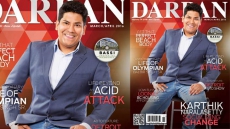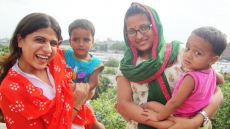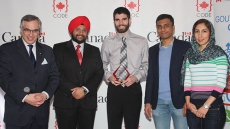Mumbai-based environmentalist and lawyer is leading the environmental movement in the city and tackling plastic pollution and other harmful concerns one step at a time.
Almost every single day, we read about news on environmental conservation and protection. Just as we struggle to survive in this fast-paced world, nature is struggling and suffering silently too. So what are you doing about it? How are you protecting your natural environment, which is essential for your growth and well-being? Even a single step towards caring for Mother Nature can do wonders. And if you think one person can’t do it alone, then here’s an excellent example proving that it’s possible. India-based environmentalist and lawyer, Afroz Shah, started the biggest beach cleanup project in Mumbai, Maharashtra, all by himself in 2015. Heartbroken after seeing the Versova beach near his house filled with garbage and all kinds of trash, Afroz decided to take matters into his own hands – literally. He along with a senior neighbour started picking up garbage from the beach everyday.
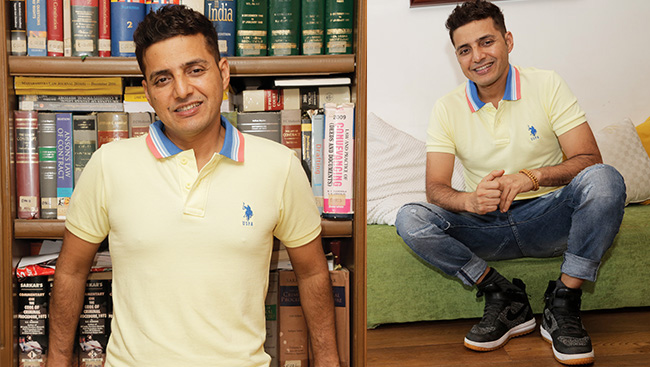
“I still remember the day very vividly of October 2015. The whole beach had tonnes of plastic,” recalls Shah. Eventually, he was joined by volunteers, that only grew in numbers each day. Witnessing the change and support the project had manifested, Shah started penning down this personal journey to save Versova beach on social media. Every week through the hashtag ‘Marine Debris Chronicles’ he gave an update on the progress of the cleanup.
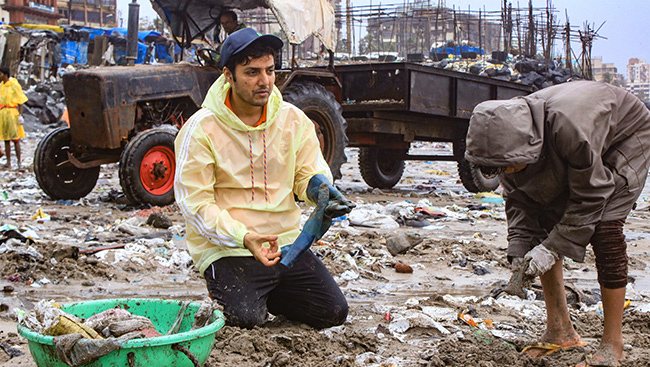
The campaign received tremendous attention and worldwide support, along with an increase in volunteers by thousands comprising of youth, slum-dwellers, entrepreneurs, Bollywood celebrities, professionals, and seniors. A shocking amount of 15 million kilograms of plastic and filth was collected from the 2.5 kilometre stretch of beach over a period of 21 months. United Nations labelled the campaign the “world’s largest beach clean-up project.”
Afroz and millions of volunteers breathed new life into the beach, which is now regularly maintained via cleanups every weekend. “We now have students, people from slums, Bollywood celebrities, lawyers, doctors, everybody wanting to connect with nature and now we are going a further level to protect nature,” says Afroz, whose honest efforts have been praised by famous personalities, politicians and global leaders. United Nations Environment Program (UNEP) honoured Afroz with the Champion of the Earth award for his work in organizing community-led clean-up efforts.
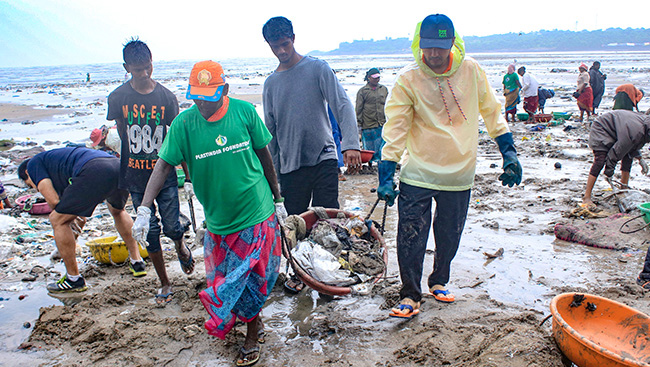
Though the Versova beach cleanup was Afroz’s most publicly-known campaign, the young lawyer has been actively involved in protecting the environment and nature since many years. “I have lived all my life on the coast of Mumbai, so mangroves are very close to me. I have been working on mangrove protection for long, it is just that I did not talk about it,” says Shah. He and his dedicated volunteers are also cleaning the mangroves and simultaneously working on other environmental concepts that aim at tackling plastic pollution and safeguarding the environment. A crucial concept among them is circular economy which Afroz explains as “reducing our waste as much as we can and whatever waste we get, we recycle.”
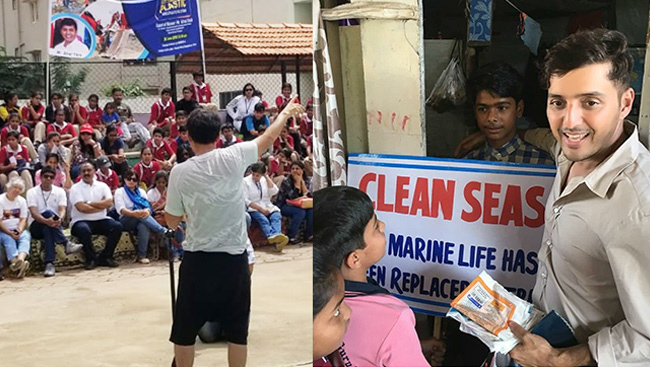
Afroz states that in Mumbai there are 60 per cent people living in what he calls a “human ocean conflict zone” – people living in slums and wadis where the Municipality doesn’t pick up their garbage. “What they do with the plastic and garbage is they throw it into the creek, from the creek it enters into the ocean and lands onto our beaches. I want to get circular economy in each of these households,” asserts Shah, who is engaging with these communities on ways to monetize plastic and get circular economy. He is also working with commercial establishments and teaching restaurants owners to be more plastic-free.
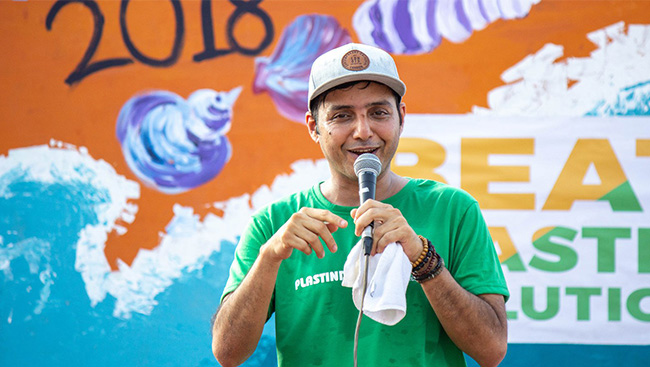
Afroz’s work with communities and commercial establishments has been getting a positive response. “We are all born to love nature. It’s only that sometimes the system either enhances it or dampens it. When you are born with it, I only have to just converse with them, explain to them and teach them what has to be done and they spring into action,” shares Afroz, further narrating a short interaction he had with Hotel Vrindavan’s owner, Praveen Shetty, while working with him. “He [Praveen] said to me that he wants to do it for his young kids and doesn’t want to leave a terrible planet to them. I asked him what stopped him from doing it for so long, he said sometimes we need a little nudge and you gave us that nudge.”

The social activist is also mentoring around 60,000 kids and getting them involved with his projects. “One Afroz is not enough for this planet. We have to create thousands and millions of Afroz who will work with the same passion and love. Then only will we as humans be able to protect other species,” he proclaims, hoping to create a huge army of ocean lovers and nature lovers who will engage constantly with the environment every week.

Afroz also wants to gradually get rid of all the plastic from the oceans and is working on this mission one step at a time. Recently, Afroz invited the divers from the Government of Maharashtra’s Mangrove Cell to use their skills to locate plastic in the ocean. Coca Cola India came forward and supported this initiative by sponsoring the gear and equipment required. “We could find plastic in the belly of the ocean. The visibility was very poor and whatever the divers could find was all plastic. So maybe post monsoon in October we will start using divers to clean the ocean,” updates the Champion of the Earth awardee. Afroz was also CNN-IBN’s Indian of the Year in Public Service in 2017 and received various accolades for his efforts.
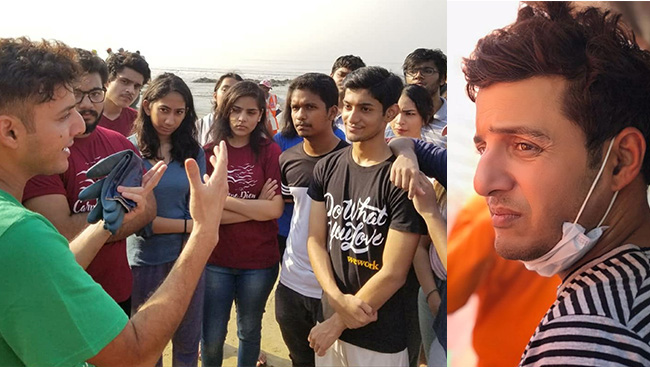
Afroz is deeply rooted in this movement and is tirelessly working towards protecting the environment and helping people reconnect with nature. “My model is very simple – don’t be a part of the problem, be a part of the solution. This whole movement of mine is based on the edifice of love, first we have to love each other and then love nature, and that is what is missing in the world.”
Though his mission has gained success and support, Afroz had to face his share of challenges and complexities along the way. Last year in November, he suspended the Versona beach cleanup campaign citing reasons such as abuse faced by goons for picking up garbage, administrative lethargy, non-clearance of picked up garbage and abuses. “I suspended the beach cleanup for 10 days in November but the other activities went on. I wrote on the post that if the ground reality changes, we will come back. Thousands of Indians and citizen all over the globe said that this movement should not stop,” recalls Shah. The suspension did not stay for long as Maharashtra Chief Minister Devendra Fadnavis, Sena Yuva President Aditya Thackeray, and Union Minister Hardeep Singh Puri intervened in the matter and promised that things will change. “Eventually the government machinery did spring into action. I am grateful for all of them [Fadnavis, Thackeray and Puri]; they made sure this movement was back on.”
I ask him if he ever felt like giving up completely because his work alone was not enough. Afroz answers, “I called my efforts a date with the ocean. And when you are on a date, you don’t want to quit. You want to keep going on. There was never a doubt on my mind.” Afroz’s movement is in fact governed by three key words – consistency, sincerity and persistency. “We all love nature but what is required of our love is that external manifestation of our love. That external manifestation for me is to put your two hands to use, whether to clean a beach, a mangrove or to get circular economy or monetize plastic. When this is the theme of your work, then everything else is secondary and quitting is certainly not on your mind,” he states.

The inspiring environmentalist’s good work is creating a ripple effect. “At this point in time in Mumbai, there are five beach cleanups going on. There are three beach cleanups going on in Dadar, one is Mahim and one in Vasai,” mentions Afroz proudly. Beside Mumbai, cleanup campaigns are taking place in various parts of India as well. Currently, cleanup of Gomti River in Lucknow and of River Khan in Indore are going on, both initiated by Afroz. He also plans to start the campaign in Delhi and Bengaluru. “It feels very nice that people want to change and want to protect their water bodies. I feel very happy that a lot of people are watching me and saying that they are inspired and want to do what I do, it is a very positive sign,” expresses Afroz. While talking about being an inspiration to many, he shares a beautiful, emotional episode he witnessed when he went to speak at Vibgyor International School recently: “All the kids were wearing a Gandhi cap. On one side it was written ‘I am Afroz’ and on the other side it was written in Hindi, ‘Mein Afroz Hoon’ [I am Afroz]. I got very emotionally charged up and I called two boys on stage and asked them why they are wearing these caps. They said ‘we want to step into your shoes.’ Hearing that I said, my work here is done.”
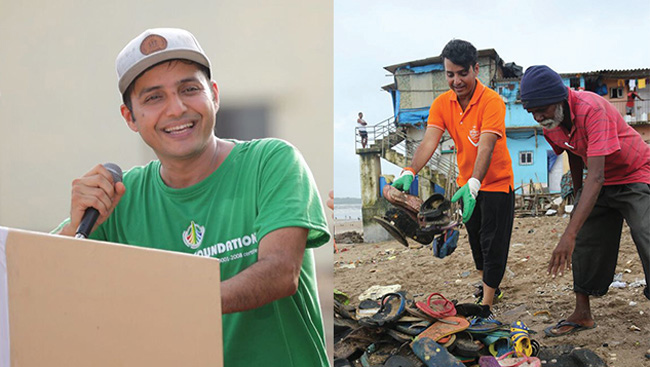
The Indian Government is also working on solutions to become more environmental-friendly. The Government of Maharashtra recently enforced a ban on single-use plastic items, including bottles and carry bags. At the World Environment Day celebrations, Union Environment Minister Harsh Vardhan pledged to eliminate all single-use plastics from the face of India by 2022. The annual average per capita consumption of plastic in India is said to be at 11 kilograms as against global average of 28 kilograms, so these introductions are definitely a positive step in ensuing that our oceans, environment and nature stay healthy – not just for the present generation but the future generations too.
Afroz applauds the government’s decision but states that there is a long way to go before Maharashtra or India becomes completely plastic-free. “You can introduce a ban but to change to alternatives or changing our habits to something which is more environment-friendly will take time. We should not expect that a Superman will arrive and will change the whole scenario about plastic,” he voices his opinion further mentioning that it is an individual problem. “It is people like you and me that litter. And then we blame the institution. What we are lacking is how to train people to handle plastic. We should not beat plastic, but we should beat plastic solution.”

Implementation and enforcement of the laws is the key, he says. “Governments are good at making laws but they need to make enforcement and implementation very important. If laws are not obeyed by the citizens, especially with environment protection, then the environment and Mother Nature suffers,” he explains. “Second they have to build up a civil society and a government partnership which is not happening at all as far as environment goes. It has to become the rhythm of our lives, rhythm of our governance model. That is the key now.” Another concern he states is that corporate companies are not doing their part with regards to Extended Producer Responsibility (EPR). “EPR has to be pushed by the local and central government and United Nations. Corporates must step in to pick up their garbage, they are the producers. There has to be a partnership between the government, the citizens and the corporate to make sure our oceans are protected and our nature is protected.”
In conclusion, Afroz’s message to youth is “to connect with nature. I would urge all the youth to start their personal journey with the environment. That is the key to building our bond with nature. We crave for companions in our lives; we should crave for the companionship of nature as well.”
